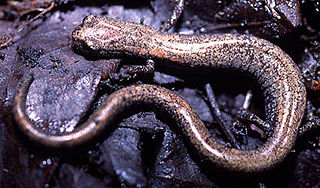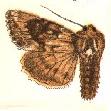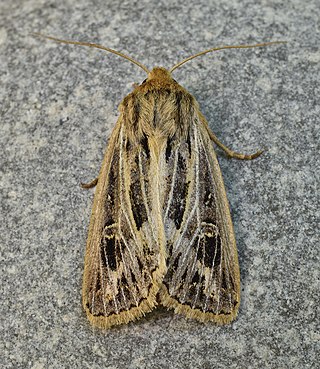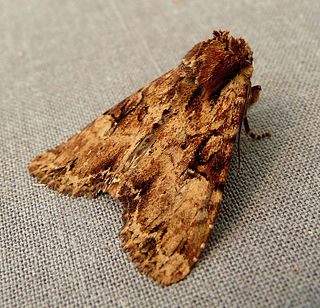
The San Gabriel slender salamander is a species of salamander. It has a worm-like body, a large head and large limbs, and an elongate cylindrical tail of less than 1.5 times its body length. An adult salamander is between 3 and 5 cm long. It has a black dorsum with white, coppery, and orange blotches, and an immaculate black venter. It may have red spots on tail.

Apamea is a genus of moths in the family Noctuidae first described by Ferdinand Ochsenheimer in 1816.

Apamea centralis is a moth of the family Noctuidae first described by Smith in 1891. It is native to North America, where its range extends from California to Alberta.
Apamea robertsoni is a moth of the family Noctuidae. It was described from Southern California in 2006.
Apamea digitula is a moth of the family Noctuidae. It was described from the Laguna Mountains of San Diego County, California, in 2006. It is also known from western Oregon.
Apamea bernardino is a moth of the family Noctuidae. It is known only from the San Bernardino Mountains of California, where it lives in coniferous forests above 2000 meters in elevation. It was first described in 2000 from a specimen collected at Barton Flats.
Apamea longula is a moth of the family Noctuidae first described by Augustus Radcliffe Grote in 1879. It is found in western North America, mostly from California to the Great Plains. There are also a few records from areas north, including Alberta, Yukon, and Alaska.

Apamea niveivenosa, the snowy-veined apamea, is a moth of the family Noctuidae. The species was first described by Augustus Radcliffe Grote in 1879. It is native to northern North America, where it can be found across Canada and south to California.

Apamea plutonia, the dusky Quaker or dusky apamea, is a moth of the family Noctuidae. The species was first described by Augustus Radcliffe Grote in 1883. It is native to northern North America, where it occurs across the boreal regions, with some occurrences from as far south as New Mexico and Pennsylvania.

Apamea scoparia is a moth of the family Noctuidae first described by Kauri Mikkola, Tomas Mustelin and J. Donald Lafontaine in 2000. It is one of the most common and widespread North American Apamea, being distributed from Newfoundland and Labrador to Alaska and British Columbia, and south to California and Arizona.

Apamea apamiformis, known by the common names rice worm moth, riceworm, and wild rice worm, is a moth of the family Noctuidae. It is found in North America, including Wisconsin, New York, Minnesota and eastern Canada, with imperiled or critically imperiled populations in Maryland and Indiana, respectively, and a vulnerable population in New Jersey.

Apamea inebriata, the drunk apamea, is a species of moth in the family Noctuidae. It is found along the east coast of North America from Nova Scotia, Canada to North Carolina, United States.

Apamea cariosa, commonly called the nondescript dagger moth, is a moth of the family Noctuidae. It is found in the northeastern United States, including New York, Maryland, Indiana and Virginia. In Canada it is found in Ontario, Quebec, New Brunswick, Alberta, and Manitoba.

Apamea inordinata is a moth of the family Noctuidae. It is found in the United States, including New York, Massachusetts, Pennsylvania, Colorado, and California. In Canada it is found in Ontario, Quebec, New Brunswick, Nova Scotia, British Columbia, Alberta, Saskatchewan and Manitoba. Its wingspan is about 34 mm. The species is listed as threatened in Connecticut.
Apamea lutosa, the opalescent apamea, is a moth of the family Noctuidae. It is found in the northeastern United States, including New York and Indiana. In Canada it is found in Ontario, Quebec, British Columbia, Saskatchewan and Manitoba.

Apamea zeta is a moth of the family Noctuidae. It has a Holarctic distribution, and can be found throughout the Northern Hemisphere. It occurs throughout Europe and the northern half of North America.

Apamea indocilis, the ignorant apamea, is a moth of the family Noctuidae. It is native to North America, where it is distributed throughout southern Canada and the northern United States. In the east its range extends from Newfoundland to South Carolina. In the west it occurs as far south as San Francisco Bay and in the Rocky Mountains to New Mexico.

Apamea rubrirena is a moth of the family Noctuidae.

Apamea epomidion, the clouded brindle, is a moth of the family Noctuidae, sub-family Hadeninae. The species was first described by Adrian Hardy Haworth in 1809. It is found throughout continental Europe, the British Isles, Sweden and Central Asia. It is also found in the Altai Mountains, west Siberia, and in Amur.

Apamea quinteri is a species of cutworm or dart moth in the family Noctuidae. It is found in North America.








